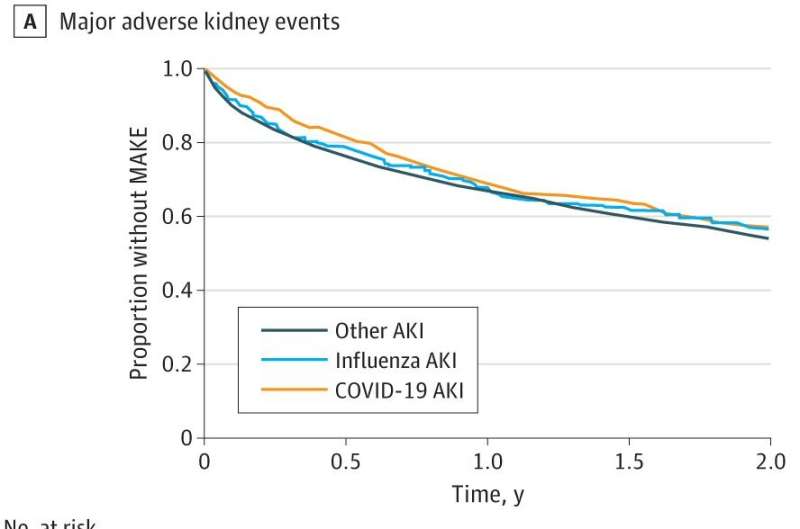This article has been reviewed according to Science X's editorial process and policies. Editors have highlighted the following attributes while ensuring the content's credibility:
fact-checked
trusted source
proofread
Reanalyzing the impact of COVID-19 on the kidneys

In a new study, Yale researchers found that adults with COVID-19 who develop acute kidney injury have a lower risk of kidney disease progression and mortality over the longer term compared to those with AKI related to other causes.
When treating patients during the pandemic, Yale School of Medicine's Abinet Aklilu, MD, MPH, postdoctoral fellow, and F. Perry Wilson, MD, MSCE, associate professor of medicine (nephrology) and public health (chronic disease epidemiology), noticed a high incidence of acute kidney injury (AKI) in individuals with COVID-19, many of whom required dialysis.
Initial studies found that in the first six months after hospital discharge, kidney function in these patients rapidly declined. Yet, until now, the long-term impact of COVID-AKI on the kidneys has remained largely unknown.
In a new study, Aklilu, Wilson, and a team of researchers set out to discover if adults with COVID-19 who develop AKI are at risk of worse kidney function trajectory and higher mortality than those who have AKI associated with other causes. The results were published in JAMA Internal Medicine.
"Early studies, including ours, were highly concerning to nephrologists and public health officials because they implied that there might be a surge of chronic kidney disease in the future due to the pandemic," Perry said. "With roughly two years of follow-up data on COVID patients, we decided to reanalyze the issue."
Another concern that prompted the study, Aklilu said, was whether physicians needed to increase the frequency of post-hospital follow-up visits with these patients. "Not only were we worried about chronic kidney disease, but also other long-term implications of AKI that could lead to early mortality," she said.
In the study, researchers used electronic health records to analyze 987 hospitalized adults with COVID-associated AKI, 276 with influenza-associated AKI, and 8,361 with AKI linked to other illnesses who survived their hospital stay and were followed for two years after hospital discharge.
Broadly speaking, the patients with COVID were sicker than the patients in the other groups and more likely to need mechanical ventilation or be in the ICU, Perry said.
Researchers discovered that even though there was a steep decline in kidney function in the COVID patients during the first six months after hospitalization, those with COVID-associated AKI had a significantly lower risk of major adverse kidney events and mortality over the longer term compared to those with AKI related to other causes.
Aklilu found the results of the study surprising. "We had expected to see worse kidney outcomes in the follow-up period for people who developed AKI in the setting of COVID compared to the other groups, but what we saw was less risk of mortality and of kidney disease progression in this group," she said.
From a public health standpoint, the study provides reassurance that COVID is not a key factor in contributing to the burden of chronic kidney disease, Wilson said. But he cautioned that despite the findings, both kidney disease and COVID are serious illnesses. "Part of what we might be seeing in this study is that COVID is quite severe, and some people never got a chance to have chronic kidney disease because they died during their hospitalization," he said.
Still, the study is good news for people struggling with COVID and long COVID, according to Aklilu and Wilson.
"There is a general concern—not just in the kidney community—about continued organ function decline in individuals who survive a COVID infection," Aklilu said. "Our research sheds a positive light on this issue."
More information: Abinet M. Aklilu et al, COVID-19−Associated Acute Kidney Injury and Longitudinal Kidney Outcomes, JAMA Internal Medicine (2024). DOI: 10.1001/jamainternmed.2023.8225



















